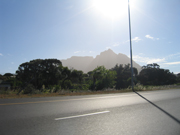|
|
|
|
 |
|
Faiths and Finance
 |
 |
 |
Everywhere there are structures - roads, railways, aquaducts, parks - set up because somebody somewhere made a decision that this is how they want the world to look. Now it is time for our generation to decide how the world will be. |
During the run up to the Kathmandu Sacred Gifts meeting in November 2000 ARC undertook a survey of the assets of its major faiths and during this discovered the vast holdings of stocks and shares which so many of the faiths have.
While there hadlong been a tradition of some faiths using a screening policy in order not to invest in certain products explicitly banned by their teachings (e.g. alcohol, pork, gambling) little has been done to seek to pro-actively invest in areas which can be seen as supportive of the principles and teachings of the faiths. The Bishop of London described it as choosing to follow the "via positiva" rather than the "via negativa".
By the time Kathmandu took place, ARC had produced a first study and book, titled A Capital Solution.
We had identified the fact that the faiths between them constitute one of the major investing blocks of the world economy and had begun to suggest that this power and influence could be more effective if it was done in collaboration with the different faiths rather than as faith groups by themselves.
The key phrase was that each faith should assess its portfolios with “due regard to the faith’s beliefs, values, the environment and human rights so that all life on Earth can benefit.”
 |
 |
 |
Each faith should assess its portfolios ‘with due regard to the faith’s beliefs, values, the environment and human rights so that all life on Earth can benefit.’ |
Why is this significant?
Because the faiths are almost unique in having a long-term perspective on investments over against the more rapacious culture of the general market. Increasingly however, ethical investments are being seen by the commercial world as of significance because of their sustainability.
Everywhere there are structures - roads, railways, aquaducts, parks - set up because somebody somewhere made a decision that this is how they want the world to look. Now it is time for our generation to decide how the world will be.
Next steps
ARC would urge finance officers for faith groups to look at their investments, and see whether they can use the money not only to make a profit, but to make a difference. The Church of England, in the UK, is one of several faith bodies which have, since 2000, taken their portfolio and examined how they can invest positively to increase good in the world, and they are beginning to take the steps to let that happen.
It is a model that every individual, of every faith and of no faith, is encouraged to follow.
Links
A Capital Solution
3iG Mission
What is good investment?
Key issues
What the press said
Investment resources for faiths
Religion and Economics
Background book by ARC and WWF
|
 |
|
|
|
|
|
 |
ARC's Diary
|
 |
February 20, 2015:
New phase for our successful Africa programme
As ARC regretfully announces that our funding for the Africa programme has come to an end, we pay tribute to the outstanding achievements of our faith partners. This work is moving into a new phase, led by our faith partners in Africa. |
 |
 |
|
|

